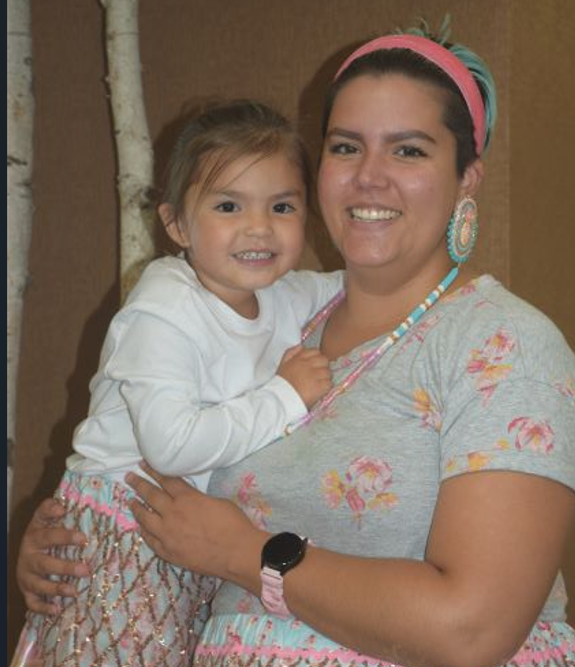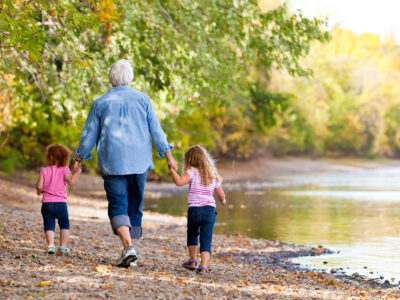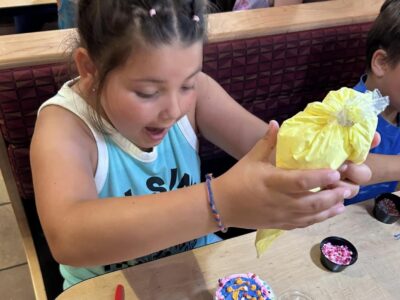Indigenous Parent Leadership Initiative celebrates graduation of inaugural class at White Earth Nation
“You are the ones to make a difference.”
Eleven women stood before family and friends this past Sunday, representing the first-ever graduating class of the Indigenous Parent Leadership Initiative at White Earth Nation.
Sharing heartfelt, personal stories illustrating their projects to help and strengthen their communities, each woman stood proudly at the podium, expressing deep gratitude for the 21-week program that integrated teachings on child development, leadership, democracy skills, and Ojibwe culture.
These are pieces of their stories.

The Northwest Minnesota Foundation has provided grant funding to All Nations Rise / Indigenous Visioning as it developed and hosted the Indigenous Parent Leadership Initiative on White Earth Nation. We are proud to be a funding partner in supporting their great work.

“The Indigenous Parent Leadership (Initiative) has taught me to use my voice, to create change. That if you don’t like something, you have to change it. It’s not going to change if you remain silent.”
Leanne Auginaush aims to create safe, supportive spaces for those who have experienced abuse.
(“IPLI) has taught be so many things. It gave me a sense of hope and belonging. It has taught me to stand strong and speak up,” she said. “It starts with us. If we want something to change, we are the people to change it.”

“I started this program as a mother, daughter, sister, auntie, cousin, community outreach worker … Now I stand here also as a parent leader.”
Karen Jones plans to create traditional healing homes grounded in the Anishinaabe culture and teachings, partnering with the tribal council and agencies in the area. The homes – one for boys, one for girls – would support those at risk of substance abuse.
“I know this project will be be successful when our young warriors graduate high school, get a driver’s license, gain employment, learn basic life skills, acquire stable college and attend college, and last but not least, understand our Anishinaabe teaching and share them,” she said.

“I started this program a really soft-spoken person … Even when it came to my kids, I was shy … But in these last 21 weeks since we began in April, I’ve learned a lot. I’ve learned how to advocate for myself, for my kids.”
Pamela Morley wants to support parents with kids in the foster care system so they can strengthen their skills and surround them in an environment of love through peer support.
“I’m really grateful for this, the (Indigenous) Parent Leadership Initiative and everything that they’ve taught me, for the push that they’ve given me to try and have a successful (support) group,” she said. “All I want is to just be able to teach them that they’re not alone in the world.”

“Native Pathways will be for young adults living on the reservation, to explore and hopefully develop new interests that will make them happy so they will be less likely to use (substances).”
Marlena Hanson’s program will partner with other tribal programs to offer internships and learning opportunities to provide young adults a greater understanding of the available trades and work options on the reservation.
“This program has helped me gain my confidence back,” she said. “I’ve very happy for this group.”

“The initiative has been an awesome learning experience for me. I was really skeptical at first, but I have grown to love these women here next to me. They’re like family. We laughed, we cried, we gossiped, and we were able to – I wouldn’t say bond, but talk about our traumas, the things that hold us back in our lives, to be able to learn from those and be the best parents that we want to be, that we want our kids to see.”
Lera Hephner, who teaches fourth through 12th grade in the Waubun school in its Ojibwe Language and Culture program, said she was fortunate to have first language speakers throughout her whole life, including her stepfather who taught her conversational Ojibwe. During her first semester at college, Lera also was able to study abroad and observe language revitalization efforts within the Māori community in New Zealand.
Her community project will be a comprehensive survey of the health of the Ojibwe language on the White Earth reservation, collecting and analyzing data for grant-writing to fund new language initiatives. She will partner with the White Earth Tribal & Community College, as well as others.
“I’m just really appreciative that this initiative is able to help me take my passion and put it into purpose,” she said.

“I just want to thank the women that were the head of the initiative, everyone who made it possible. It was a terrific learning experience. Like Lera, I was very skeptical. But it was a great experience. I’ve come to learn from these women and love them so much. It’s like she said, we’re a family now. I’m very grateful for that.”
For her project, Stephanie Longfield aims to teach youth ages 15 to 17 life skills, such as how to open a bank account, check your credit rating, maintain a vehicle, and buy a home. She plans to first survey high schools to find what is and what is not being taught, and developing a curriculum to cover those missing pieces.
“I hope to have a part in this (IPLI) later one, maybe as a facilitator,” she said.

“It is an honor, for such an opportunity to come to the White Earth reservation. The Indigenous (Parent) Leadership Initiative was empowering. It taught me how to use my voice and to be an advocate in my community. I couldn’t be more grateful. Because now I have a bigger extended family.”
Lacy Lee Armstrong plans to advocate for families recovering from substance abuse. She wants to build healthier families by supporting and offering training to mothers and women on the reservation.
“My project is going to be healing within the family, breaking the cycle,” she said. “I want to bring that to the community.”

“I have thoroughly enjoyed the last 21 weeks. All of these women, they have become my family. I look forward to meeting with them every week. Thank goodness for the chat group that we have!”
Melanie Anderson’s project is to bring a mindfulness and meditation program to White Earth Nation for youth ages 12 to 17.
“I am enrolled in a program called Breathe for Change, which is a yoga mindfulness, meditation, social emotional learning program for educators and community leaders,” she said. “I hope to bring that to all of the communities within my area and into the schools.”

“I just wanted to say thank you. This program is really empowering it gave me my voice back.”
Autumn Oppegard’s project will advocate for those in recovery and provide them with personal care items as they enter treatment programs.
“It is (providing) care packages for people going into treatment, to have them able to wake up in the morning and take a shower and have that confidence going into the group and be ready for the day,” she said.

Early in the 21-week series, Susie Ballot questioned whether she should continue in the IPLI series.
“I thought maybe this isn’t right for me, so maybe I should just not continue. But there was something that kept bringing me back, and I enjoyed every time we got back together as a group, and I just continued going, and I kept learning something different each time.”
Susie’s project is aimed at helping all ages who feel disconnected to reconnect with their Anishinaabe culture. She has been working with pipe carriers to help build reconnection through ceremony.
“My project consists of connecting through naming,” she said. “I want to get the people in my community to come together in creating a learning experience where our young people would be able to connect to who they were as Anishinaabe people by finding out what their names were.”
Eventually, she wants the ripple effect to reach all people on the reservation so all young people feel connected as Anishinaabe people.
“As an Alaskan native, one of the things that we do for our children is give them their Eskimo name right away – we make sure that they have their name before they’re even born. When we name them, they’re named after a specific person and they take on that trait of that person so they already have a sense of identity right off the top. That’s what I want for our babies, our young people, our old people – to know who they are. That is my goal, to help our young people not feel so lost.”

“We all want change in our communities, and it will be great for our kids to see us doing these things. I think it’s a big advantage for our kids, to see great leadership in their mothers.”
Page Lhotka is focused on building self-esteem in girls, helping them grow stronger as young adults and then mothers. Her hope is that with a stronger foundation, they will break cycles of domestic violence.
“I want to thank the Initiative,” Page said. “It’s been wonderful. We all have our own projects, but also at the end of the day we’re all in this together and I feel like it will go far. I really hope that it is a ripple effect.”

Kris Manning, IPLI facilitator, pictured at left, introduced her comments by reflecting back on community meetings held in the wake of opioid overdoses in her community.
“We had our elected officials, we had our department leaders, and we had our community members there. We listened to the stories and they were heartbreaking and they really moved us. Our community members wanted help. They were looking for leaders for help. They were looking to the departments for help. Like, what can we do? They were scared.”
Following that meeting, Kris connected with the IPLI program and accepted the opportunity to join as a facilitator.
“We as a community need to look within ourselves. We don’t need to look to our elected leaders. We don’t need to look to our department heads. Because the answers for the change in our community come from us,” she said.
Beth Ann Dodds, IPLI project coordinator and facilitator, asked the graduates to place their hand over their hearts as she addressed them.
“You feel that? Can you feel the rhythm of your heart? May the light of your soul guide you. May the light of your soul bless the work you do with the love and warmth of your heart. May we see in what you do the beauty of your own soul. May the sacredness of your work bring healing, light and renewal to those who work with you. May your work never weary you. May it release within you wellsprings of refreshment, inspiration, and excitement. You are safe, you are whole, you are worthy, you are deeply appreciated. You are changemakers.”
(Pictured are, from left, Kris Manning, IPLI facilitator, Beth Ann Dodds, IPLI project coordinator and facilitator, and Lisa Johnson, facilitator.)

“I never thought I would be a representative of the people.”
Henry Fox, the recently elected District I Representative on the White Earth Tribal Council, pledged his support to the projects championed by the graduates and reflected on his own personal journey into a role of leadership.
“But here I am,” he said. “I have been elected and this is what I’m elected for. Whenever they call, I come out.”
Henry said that if he had the time, he would also be interested in taking part in the second cohort for the IPLI, which begins in November.
“As Native people, we have a big heart and we care,” he said. “We care a lot more. Like when things go on in each of our communities or even on the (reservation), we pull together. That’s who we are. When families are struggling, we reach out and help.”

“As the wise Dr. Anton Treuer has taught us, knowing the importance of culture is a protective factor and a healing factor. I hope that you found a sense of protection and healing and purpose during this time here.”
A video-recorded congratulatory speech from Lt. Gov. Peggy Flanagan was shared at the beginning of the ceremony as she offered heartfelt congratulations to the graduates.
“As lieutenant governor and an Anishinaabe (person),” stated Lt. Gov Flanagan, herself a member of the White Earth Band of Ojibwe, “I understand the ways it can be difficult to navigate systems that weren’t designed for or by our people. But through the power of community, we can heal and we can move forward together.”
As she offered words of thankfulness to White Earth Nation and the partners and funding of the program, she closed by addressing the graduates directly.
“Thank you, parents, for investing in yourselves. I hope this is just the beginning. You have a huge fan over here, and I can’t wait to see what comes next.”








